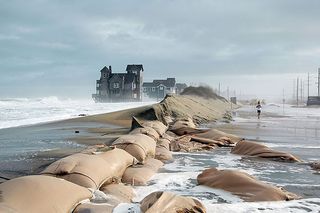Even Doubters Want to Prepare for Global Warming

Some still insist that climate change is a hoax, but the vast majority of Americans believe the globe is warming, a new survey finds — and they want to prepare for the worst.
In fact, even 60 percent of climate-change doubters favored preparations, the survey found. Researchers collected opinions between March 3 and March 18 via an online questionnaire, using a nationally representative sample of 1,174 American adults, both English and Spanish speaking.
The survey asked about climate-change beliefs and support for adaptation strategies to help coastal areas cope with the rising sea levels and frequent, intense storms that a warmer world could bring. The results showed that 82 percent of Americans are in favor of preparation.
"Few people believe these preparations will harm the economy or eliminate jobs," survey director Jon Krosnick, a senior fellow at the Woods Institute for the Environment at Stanford University, said in a statement. "In fact, more people believe that preparation efforts will help the economy and create jobs around the U.S., in their state and in their town than think these efforts will harm the economy and result in fewer jobs in those areas.
"But people want coastal homeowners and businesses that locate in high-risk areas to pay for these measures," he said.
The survey found high levels of belief in global warming, with 82 percent of respondents agreeing that Earth's temperatures have risen over the last century. People tended to see efforts to hold back Mother Nature as futile, Krosnick said. Instead, they preferred preparation strategies that would reduce exposure to risk. For example, 48 percent of respondents supported sand dune restoration, and 33 percent favored replenishing eroding beaches with sand.
At the same time, 37 percent said structures should be moved inland to protect them from flooding and storm surges, and 33 percent supported the construction of sea walls. [Weather vs. Climate: Test Yourself]
Sign up for the Live Science daily newsletter now
Get the world’s most fascinating discoveries delivered straight to your inbox.
The most popular policy suggestions were the strengthening of coastal building codes to minimize damage from storms and flooding (supported by 62 percent of respondents), and the prevention of new construction close to the coast (supported by 51 percent).
"The question is, how does public support for preparation translate to action?" said Meg Caldwell, executive director of the Center for Ocean Solutions, which co-commissioned the survey.
"Our impulse is to try to move quickly to put communities back together the way they were after devastation. But that impulse often leads to doubling down on high-risk investments, such as rebuilding in areas likely to experience severe impacts," Caldwell said in a statement. "To move toward long-term resiliency for coastal communities, we need to seize opportunities to apply new thinking, new standards and long-term solutions."
Krosnick presented the results of the survey March 28 at the National Press Club in Washington, D.C.
Follow Stephanie Pappas on Twitter and Google+. Follow us @livescience, Facebook & Google+. Original article on LiveScience.com.

Stephanie Pappas is a contributing writer for Live Science, covering topics ranging from geoscience to archaeology to the human brain and behavior. She was previously a senior writer for Live Science but is now a freelancer based in Denver, Colorado, and regularly contributes to Scientific American and The Monitor, the monthly magazine of the American Psychological Association. Stephanie received a bachelor's degree in psychology from the University of South Carolina and a graduate certificate in science communication from the University of California, Santa Cruz.
Most Popular

